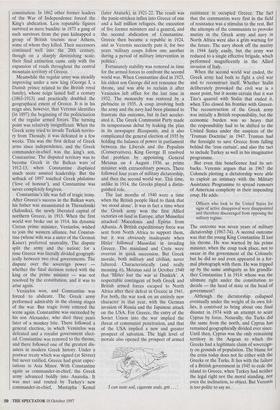The Colonels and the Kings depart
C. M. Woodhouse THE MILITARY IN GREEK POLITICS: FROM INDEPENDENCE TO DEMOCRACY by Thanos Veremis C. Hurst and Co, £16.50, pp. 227 he present is a good moment for Professor Veremis's meticulous study, because there has been no crisis in the Greek armed forces for nearly a quarter of a century. Curiously enough, the regular army (and, to a lesser extent, the navy) was more liable to political disturbance in this century than in the last. As Veremis says, 'Between 1833 and 1897 the involvement of the regular forces in political conspiracies and upheavals was minimal'. But the emphasis there is on the 'regulars', not the 'irregulars' or guerrillas who fought the War of Independence. Veremis's choice of dates is also significant.
In 1833 Otto of Bavaria arrived as the first king of Greece, with a retinue of German advisers. It was a difficult time to begin a new administration. The glamour was fading of the battle of Navarino (1827), in which the British, French and Russian navies secured Greek independence by destroying the Turko-Egyptian fleet. Otto's immediate predecessor, President John Capodistria (an expatriate Greek, formerly the Tsar's foreign minister) had been assas- sinated in 1831 by the son of a family prominent in the War of Independence. There was a suspicion, which Veremis is inclined to accept, of French collusion in the plot against Capodistria. Greece was in chaos again, faced with the overwhelming problem of forming a regular army out of irregular bands which recognised no discipline except that of their individual, familiar captains.
Even those enrolled in the regular army continued their old habits. In 1843 an emi- nent guerrilla leader who had become a general in the regular army (and wrote a fascinating autobiography) led a coup to force King Otto to sign an ill-conceived constitution. In 1862 other former leaders of the War of Independence forced the King's abdication. Less reputable figures survived as mere bandits: in 1873 a gang of such survivors from the past kidnapped a group of British tourists near Athens, some of whom they killed. Their successors continued well into the 20th century, though on a sharply diminishing scale; their final extinction came only with the expansion of roads throughout the central mountain territory of Greece.
Meanwhile the regular army was steadily improving under a new king (George I, a Danish prince related to the British royal family), whose reign lasted half a century (1863-1913) and practically doubled the geographical extent of Greece. It is in his reign also, however, that Veremis identifies (in 1897) the beginning of the politicisation of the regular armed forces. The turning point was relatively insignificant When the Greek army tried to invade Turkish territo- ry from Thessaly, it was defeated in a few weeks. This was the first defeat of Greek arms since independence, and the Greek commander-in-chief was the king's son, Constantine. The disputed territory was to become Greek in the Balkan wars of 1912-13, when Constantine displayed much more assured leadership. But the setback of 1897 touched Greek philotimo Clove of honour'), and Constantine was never completely forgiven.
Constantine's life was full of tragic irony. After Greece's success in the Balkan wars, his father was assassinated in Thessaloniki (Salonika), the newly liberated capital of northern Greece, in 1911 When the first world war broke out in 1914, his dynamic Cretan prime minister, Venizelos, wished to join the western alliance, but Constan- tine (whose wife was a sister of the German Kaiser) preferred neutrality. The dispute split the army and the nation; for a time Greece was literally divided geograph- ically between two rival governments. The dispute over the sovereign power — whether the final decision rested with the king or the prime minister — was not resolved by the constitution, and it was to arise again.
Venizelos won, and Constantine was forced to abdicate. The Greek army performed admirably in the closing stages of the war. But tragic irony entered the scene again. Constantine was succeeded by his son Alexander, who died three years later of a monkey bite. There followed a general election, in which Venizelos was defeated and a royalist government elect- ed. Constantine was restored to the throne, and there followed one of the greatest dis- asters in modern Greek history. Under a postwar treaty which was signed (at Sevres) but never ratified, Greece had great expec- tations in Asia Minor. With Constantine again as commander-in-chief, the Greek army advanced boldly into Anatolia. It was met and routed by Turkey's new commander-in-chief, Mustapha Kemal (later Ataturk), in 1921-22. The result was the panic-stricken influx into Greece of one and a half million refugees, the execution of five former ministers and a general, and the second abdication of Constantine. Greece then became a republic in 1924, and as Veremis succinctly puts it, for two years 'military coups follow one another during a period of military intervention in politics'.
Fortunately stability was restored in time for the armed forces to confront the second world war. When Constantine died in 1923, his eldest son George did not renounce the throne, and was able to reclaim it after Venizelos left office for the last time in 1932. The monarchy was restored by a plebiscite in 1935. A coup involving both the army and the navy had been planned to frustrate this outcome, but in fact acceler- ated it. The Greek Communist Party made its tempestuous debut by leaking the plan in its newspaper Rizospastis, and it also complicated the general election of 1935 by holding the balance of power in parliament between the Liberals and the Populists (Conservatives). King George II resolved that problem by appointing General Metaxas on 4 August 1936 as prime minister with extraordinary powers. There followed four years of military dictatorship, and then the second world war. This time, unlike in 1914, the Greeks played a distin- guished role.
The last months of 1940 were a time when the British people liked to think that 'we stood alone'. It was in fact a time when the Greek army won the first Allied victories on land in Europe, after Mussolini attacked Macedonia and Epirus from Albania. A British expeditionary force was sent from North Africa to support them, but it was obviously inadequate when Hitler followed Mussolini in invading Greece. The mainland and Crete were overrun in quick succession. But Greek morale, both military and civilian, never faltered. Characteristically (and really meaning it), Metaxas said in October 1940 that 'Hitler lost the war at Dunkirk'. A respectable contingent of both Greek and British armed forces escaped to North Africa after their defeat in Greece in 1941. For both, the war took on an entirely new character in that year, with the German invasion of Russia and the Japanese attack on the USA. For Greece, the entry of the Soviet Union into the war implied the threat of communist penetration, and that of the USA implied a new and greater prospect of salvation. The high level of morale also opened the prospect of armed 'I can taste soil, cigarette ends, grit . . resistance in occupied Greece. The fact that the communists were first in the field of resistance was a stimulus to the rest. But the attempts of the communists to provoke mutiny in the Greek army and navy in North Africa were also a grim warning for the future. The navy shook off the mutiny in 1944 fairly easily, but the army was reduced to a single effective brigade, which performed magnificently in the Allied invasion of Italy.
When the second world war ended, the Greek army had both to fight a civil war and to reconstruct itself. Whether Stalin deliberately provoked the civil war is a moot point, but it seems certain that it was Tito's quarrel with Stalin that ended it, when Tito closed his frontier with Greece. The reconstruction of the Greek army was initially a British responsibility, but the economic burden was so heavy that the responsibility had to be shifted to the United States under the auspices of the 'Truman Doctrine' in 1947. Truman had the foresight to save Greece from falling behind the 'iron curtain', and also the tact to include Turkey as well in his imaginative programme.
But even this beneficence had its set- backs. Veremis argues that in 1967 the Colonels plotting a dictatorship were able to exploit an intimacy with the Military Assistance Programme to spread rumours of American complicity in their impending coup. He adds:
Officers who look to the United States for signs of active disapproval were disappointed and therefore discouraged from opposing the military regime.
The outcome was seven years of military dictatorship (1967-74). A second outcome was that the young King Constantine II lost his throne. He was warned by his prime minister, when the coup took place, not to swear in the government of the Colonels; but he did so and even appeared in a for- mal photograph with them. He was tripped up by the same ambiguity as his grandfa- ther Constantine I in 1914: whose was the ultimate right under the constitution to decide — the head of state or the head of government?
Although the dictatorship collapsed eventually under the weight of its own fol- lies, it contrived to bring about one final disaster in 1974 with an attempt to seize Cyprus by force. Naturally, the Turks did the same from the north, and Cyprus has remained geographically divided ever since. Until then, Cyprus was the only remaining territory in the Aegean to which the Greeks had a legitimate claim of sovereign- ty on grounds of population. The blame for the crisis today does not lie either with the Greeks or the Turks. It lies with the failure of a British government in 1945 to cede the island to Greece, when Turkey had neither the legal right nor the moral standing, nor even the inclination, to object. But Veremis is too polite to say so.



























































































 Previous page
Previous page